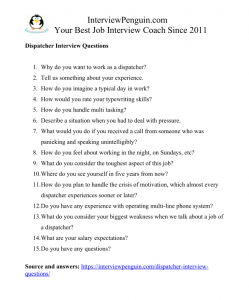Regardless of whether you apply for a dispatcher job with the government, a taxi service, a fright company, a logistics giant, or any other public or private organization, interviewers will try to assess certain abilities and skills in your interview:
- Your ability to react promptly and take the most appropriate action in any given situation.
- Stress resistance and resilience.
- Ability to stay focused on long shift (12 or even 24 hours).
- Typewriting and listening skills.
- Your motivation and why you want to have the job.
- Ability to operate multi-line phone console system.
Let’s have a look at the questions they will ask you, and how you can convince them of your readiness for the job.
Table of Contents
Why do you want to work as a dispatcher?
Easy question for many other jobs, but a tricky one for this position. Dispatchers do not earn a lot (about $35,000 annually in the US), which is much less than you’d earn on almost any other job with similar stress levels and responsibilities.
What’s more, working as a dispatcher can be extremely tiring and can drain one physically and emotionally. Add to it 12 or 24 hours long shifts, and you may wonder why you actually apply for the job. Or anyone else for that matter… Surely, we have to do some job to have money to live (or at least survive), but that’s not something you should mention in an interview.
You should find some realistic reason, trying to convince the interviewers that you won’t quit after two weeks, or as soon as a better offer rings your inbox.
If you apply for a job of a 911 dispatcher, you can say that you are motivated to help the local community. You simply feel the calling to help people, but weren’t born to be a policeman or a firefighter, and this is your way of joining the battle against violence and misfortune.
If you apply in a corporate sphere, you can say that you enjoy the adrenaline of the job, the constant action in which you’ll play your important part. You can also say that you have good predispositions for this work, and with your level of education and with your skills it simply feels like a good choice–at least at the moment.
One way or another, you should try to convince them that job of a dispatcher isn’t your last choice–even if it is.
Tell us something about your experience.
Any job in which you did long shifts, or experienced pressure, or had to respond to a lot of requests in a short time makes for a relevant working experience.
Call center operator, waitress, taxi driver, receptionist in a busy hotel/company, construction worker–all these jobs can prepare one for a role of a dispatcher. The key is to find the connection and to help the interviewers see this connection.
For example, if you worked as a waitress, you can say that the restaurant was super busy and understaffed, and you basically didn’t have a time to rest during your 12 hour long shift. You had to remember many orders and work effectively, in order to satisfy the clients.
See the similarity with a role of a dispatcher? You can bet that the interviewers will see it as well–you just have to help them with the right description of your former jobs…
How do you imagine a typical day in work?
The key is to show realistic expectations. Obviously a job at 911 differs from a job in a taxi service, or in a logistics company. However, you will be busy in all these working environment. And you will answer a lot of phone calls.
Say that you expect to have your hands full, to spend all days on the phone, to typewrite while talking to people on the other end, to send messages or make calls to your colleagues, and so on. Adjust your answer to the particular place of work.
Do not forget to speak with enthusiasm. They should get an impression that you are looking forward to your new job.
I remember interviewing applicants for jobs with similar workload and stress levels than this one. I could sometimes sense how much the applicant hated the job, before they even started doing it. I could sense it from their tone of voice an attitude. They wanted to get in only to earn money.
Needless to say, none of those candidates were hired. Ensure that the same thing won’t happen to you…
* Special Tip: To know how to answer the question, and to actually come up with an excellent answer on a big day, are two different things. If you experience anxiety, or do not really know what exactly you’d say when facing these questions, have a look at our Interview Success Package. Up to 7 excellent answers to each tricky interview question will help you find the right words when it matters the most. Because answering questions with silence always has just one outcome–someone else gets the job. Prepare for all questions with the package and ensure it won’t happen to you…
How would you rate your typewriting skills?
I suggest you to be modest, and realistic. They can easily ask you to sit in front of a computer, dictate you something in a quick voice, and let you record the conversation. In fact this is a common practice in many job interviews. I did it with applicants for data entry, secretary, or office assistant jobs.
It is always better to be modest about your computer skills, and surprise the interviewers positively in a practical test, then to boast about your impeccable typewriting skills and then manage less than 30 words per minute in a test…
How do you handle multi tasking?
The best way to explain your ability to multitask is narrating a situation from your past job in which you demonstrated this ability.
For example, you had to listen to someone and at the same time enter their words to MS Word (or equivalent), or you had to answer two phone calls simultaneously, or write a message to someone while you were listening to someone else.
Ensure the interviewers that your brain can switch quickly from one activity to another (in a flash), that you can prioritize your work, and basically that you can handle doing two things at the same time, as long as you do one almost subconsciously (for example transcribing someone’s message while listening to them).
Special Tip: Download the full list of questions in a one page long PDF, and practice your interview answers anytime later:

Describe a situation when you had to deal with pressure.
Your attitude matters more than the situation you narrate. It doesn’t even have to be work-related (if you apply for your very first job, you can talk about a stressful situation from school).
Ensure the interviewers that you didn’t let the pressure to get the better of you, that you managed to control your emotions. You simply continued focusing on your job, trying your best, trying to be effective, and didn’t pay too much attention to the expectations or opinions of the others.
The key is to convince them that you can handle the pressure with a cool head, that it won’t affect you physically or mentally (or at least not significantly).
What would you do if you received a call from someone who was panicking and speaking unintelligibly?
Say that you won’t panic. You will repeatedly ask them to calm down, and then start with asking targeted questions, such as what is their name, what problem do they experience, why they are calling, how can you help them, etc.
Of course the right questions depend on the exact dispatcher position you have, and may change from one phone call to another. Nevertheless, you know how to address such a call, and that is what matters for the interviewers.
Other questions you may face in your dispatcher interview
- How do you feel about working in the night, on Sundays, etc?
- What do you consider the toughest aspect of this job?
- Where do you see yourself in five years from now?
- How do you plan to handle the crisis of motivation, which almost every dispatcher experiences sooner or later?
- Do you have any experience with operating multi-line phone system?
- What do you consider your biggest weakness when we talk about a job of a dispatcher?
- What are your salary expectations?
- What would your former colleagues say about you?
- Tell me one thing about yourself you wouldn’t want me to know.
- What does integrity mean to you?
- Do you have any questions?
Conclusion and next steps
You typically won’t face a tough competition in your interview for a job of a dispatcher. This makes things much easier. However, you still have to convince them of your motivation and readiness for the job (long shifts, pressure, multi-tasking, long hours on the phone).
Read this article again, and try to prepare an answer to each of the questions. And if you struggle finding the right words, have a look at our Interview Success Package, and let us spoon-feed you with the answers the hiring managers want to hear from you… Thank you for checking it out, I wish you good luck!
Matthew
May also interest you:

